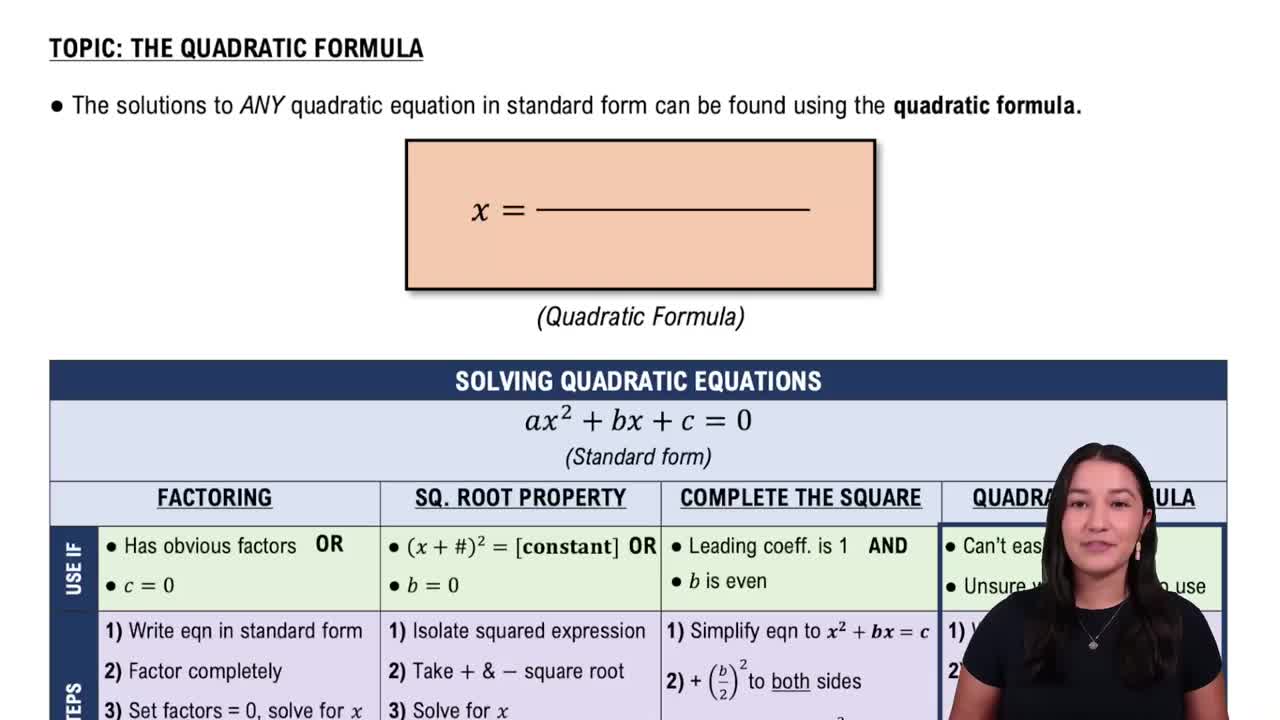Exercises 82–84 will help you prepare for the material covered in the next section. Let f(x)=an(x4−3x2−4). If f(3)=−150, determine the value of a_n.
Table of contents
- 0. Review of Algebra4h 18m
- 1. Equations & Inequalities3h 18m
- 2. Graphs of Equations1h 43m
- 3. Functions2h 17m
- 4. Polynomial Functions1h 44m
- 5. Rational Functions1h 23m
- 6. Exponential & Logarithmic Functions2h 28m
- 7. Systems of Equations & Matrices4h 5m
- 8. Conic Sections2h 23m
- 9. Sequences, Series, & Induction1h 22m
- 10. Combinatorics & Probability1h 45m
4. Polynomial Functions
Zeros of Polynomial Functions
Problem 105
Textbook Question
Find all complex zeros of each polynomial function. Give exact values. List multiple zeros as necessary.* ƒ(x)=5x3-9x2+28x+6
 Verified step by step guidance
Verified step by step guidance1
Start by writing down the polynomial function: \(f(x) = 5x^3 - 9x^2 + 28x + 6\).
Use the Rational Root Theorem to list all possible rational roots. These are of the form \(\pm \frac{p}{q}\), where \(p\) divides the constant term (6) and \(q\) divides the leading coefficient (5). So possible roots are \(\pm 1, \pm 2, \pm 3, \pm 6, \pm \frac{1}{5}, \pm \frac{2}{5}, \pm \frac{3}{5}, \pm \frac{6}{5}\).
Test these possible roots by substituting them into \(f(x)\) to find at least one root that makes \(f(x) = 0\). This root will be a zero of the polynomial.
Once a root \(r\) is found, perform polynomial division (either synthetic or long division) to divide \(f(x)\) by \((x - r)\), reducing the cubic polynomial to a quadratic polynomial.
Solve the resulting quadratic equation using the quadratic formula \(x = \frac{-b \pm \sqrt{b^2 - 4ac}}{2a}\) to find the remaining zeros, which may be real or complex.
 Verified video answer for a similar problem:
Verified video answer for a similar problem:This video solution was recommended by our tutors as helpful for the problem above
Video duration:
7mPlay a video:
Key Concepts
Here are the essential concepts you must grasp in order to answer the question correctly.
Complex Zeros of Polynomial Functions
Complex zeros are the values of x, possibly including imaginary numbers, that make the polynomial equal to zero. Finding all complex zeros involves solving the polynomial equation f(x) = 0, which may require factoring, synthetic division, or applying the quadratic formula when necessary.
Recommended video:

Complex Conjugates
Polynomial Division and Factoring
Polynomial division, including synthetic division, helps simplify higher-degree polynomials by dividing out known factors. Factoring breaks the polynomial into products of lower-degree polynomials, making it easier to find zeros by setting each factor equal to zero.
Recommended video:
Guided course

Introduction to Factoring Polynomials
Quadratic Formula
The quadratic formula, x = (-b ± √(b² - 4ac)) / 2a, is used to find exact roots of quadratic equations. When a polynomial is factored into a quadratic factor, this formula helps find complex or real zeros, especially when factoring is not straightforward.
Recommended video:

Solving Quadratic Equations Using The Quadratic Formula
Related Videos
Related Practice
Textbook Question
267
views
